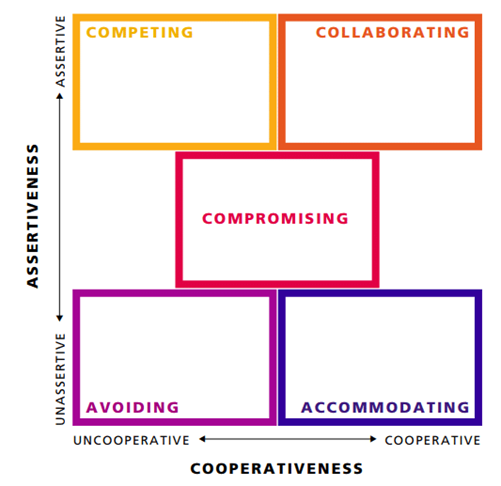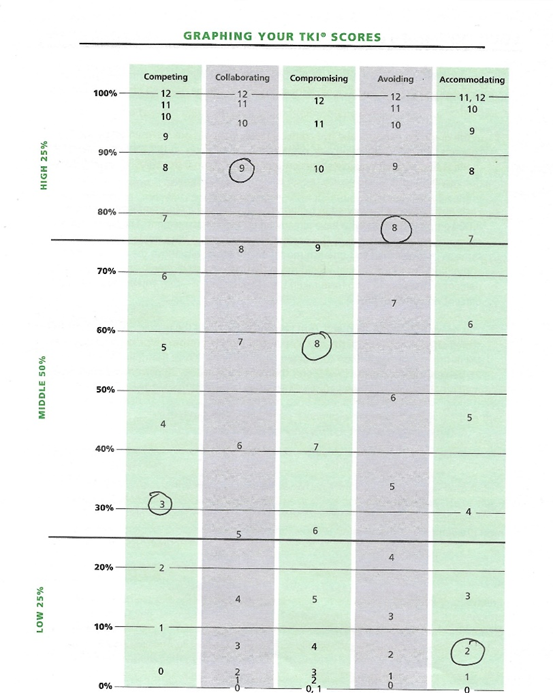[ad_1]
Recently I did a Thomas Kilmann Conflict Mode Instrument. Little did I realize that it was one of the best assessments I have ever taken, which deals with how you respond to situations. I want to point out the questions which were a part of my assessment.
A.I try to find a compromise solution.
B.I attempts to deal with all of his/her and my concerns.
A.I try to find a compromise solution.
B.I sometimes sacrifice my own wishes for the wishes of another person
A.I am firm in pursuing my goals.
B.I try to find a compromise solution
Thomas Kilmann Conflict mode Instrument(TKI) assessment helps assess the individual behavior in conflict resolution where there are concerns between two people who appear to be not in line with each other. In this situation, we can put this into two dimensions 1) Assertiveness which is the extent to which individuals attempt to satisfy their concerns, and Second 2)Cooperativeness which is the extent to which the individual attempts to assuage other’s concerns and dilemmas.


These two dimensions will help understand the method of understanding and dealing with conflict management.
Competing -It is kind of being very Uncooperative and being perceived as being in a powerful mode. So this person will continuously pursue their concerns at the expense of others. They will do anything in line with her potentially powerful position — competing means standing up for your right and defending your proper stance, and just going for the win.
Collaborating-It is being cooperative in some sense. Here we are talking about a situation where the other person is trying to find a solution that is satisfying both at the same time. It is at the same time trying to find an alternative that helps settle both sets of concerns. Collaborating would mean exploring differences and learning from each other’s insights; in other words trying to find a solution that will satisfy both the parties.
Compromising-It is a mixture of both assertiveness and Cooperativeness. When we are looking to compromise, we look at a middle path that partially satisfies both parties. So basically, it is in between Competing and Collaborating. So it addresses the issue more directly than avoiding it. Compromising would sometime mean splitting the difference and seeking a middle-ground position.
Avoiding –In this type of situation, they do not address the conflict. So basically, it is sidestepping the issue or simply putting together withdrawing from a threatening situation. Avoiding is completely Unassertive and Uncooperative.
Accommodating-It is also being unassertive and cooperative. As the name suggests, this person will automatically neglect their concern, and there is an element of self-sacrifice in this mode. It can come in many forms and Shapes. It can be selfless generosity and Charity and obeying another person’s order when you would prefer not to o yielding to another point of view.
So, after all these, the TKI profile is built-in, which will lead to Conflict handling modes you would use in the kind of conflicts you face every day. The scale on which it is judged is based from 0 for deficient use to 12 for very high use and circling your score on each of the five modes.
Each possible score is graphed `in relation to the scores of a representative sample of 8000 employed adults who have already taken the TKI assessment. The Horizontal lines represent percentiles. That is the number of people who scored the same as lower than you on each mode. If the score falls above the 75% line on competing, that would mean that you scored higher than the 75percent of people who have taken the TKI assessment. Or in other words, you are in the top 25% of the competition. Scores that fall in the top 25% are considered high.
Similarly, scores that fall in the bottom 25% are considered low. Scores that fall in the middle 50% are considered medium. Here is the representation below
Now the most important part of Interpreting your score

Now, as I said before that there are no right and wrong answers, but if you go by conventional wisdom, we can safely say,” Two heads are better than one”(Collaborating), but it also says, “Kill your enemies with kindness”(Accommodating),” Split the difference”(Compromising),” Leave well enough alone”(Avoiding) and “Might make right”(Competing). While it will be befitting were to say that effectiveness of a given conflict-handling mode will depend on the requirements of the specific situation and the skill with which you can use the method.
Now the conflict behavior is the net result of the previous personal predispositions we have and the requirement of the situation where we find ourselves. So what is most important here is that we can use all the five conflict-handling modes. However, some people use some ways more than others, and many have a clear favorite.
Here are questions you need to ask if your score is in the high range or low range within the modes.
Competing (High Range)
- Do Yes People surround you?
- Are others afraid to admit ignorance and uncertainties to you?
Competing (Low Range)
- Do you feel powerless in situations?
- Do you have issues with taking a firm stand for yourself?
Collaborating (High Range)
- Do you sometimes spend time discussing issues in depth?
- Do you have A Collaborative behavior flaw?
Collaborating (Low Range)
- Do you have difficulty seeing opportunities for problem-solving?
- Are others not committed to your policies?
Compromising (High Range)
- Do you sometimes concentrate heavily on the practicalities and tactics of compromise and forget the big picture?
- Do you dislike bargaining and trading route?
Compromising (Low Range)
- Do you feel embarrassed in a standard give and take bargaining situation?
- Do you find it difficult to make concessions?
Avoiding (High Range)
- Does it sometimes appear that you are walking on eggshells?
- Does Coordination suffer as people have difficulty getting your input on issues?
Avoiding (Low Range)
- Do you sometimes feel other people‘s feelings?
- Do you get overwhelmed by the number of issues?
Accommodating (High Range)
- Do you feel the ideas and concerns sometimes do not get the attention they deserve?
- Is your discipline lacking in you?
Accommodating(Low Range)
- Do you sometimes have trouble building goodwill with others?
- Do others sometimes regard you as a little unreasonable?
Overall I found this instrument very good in terms of resolving conflict situations.
[ad_2]
Source link



